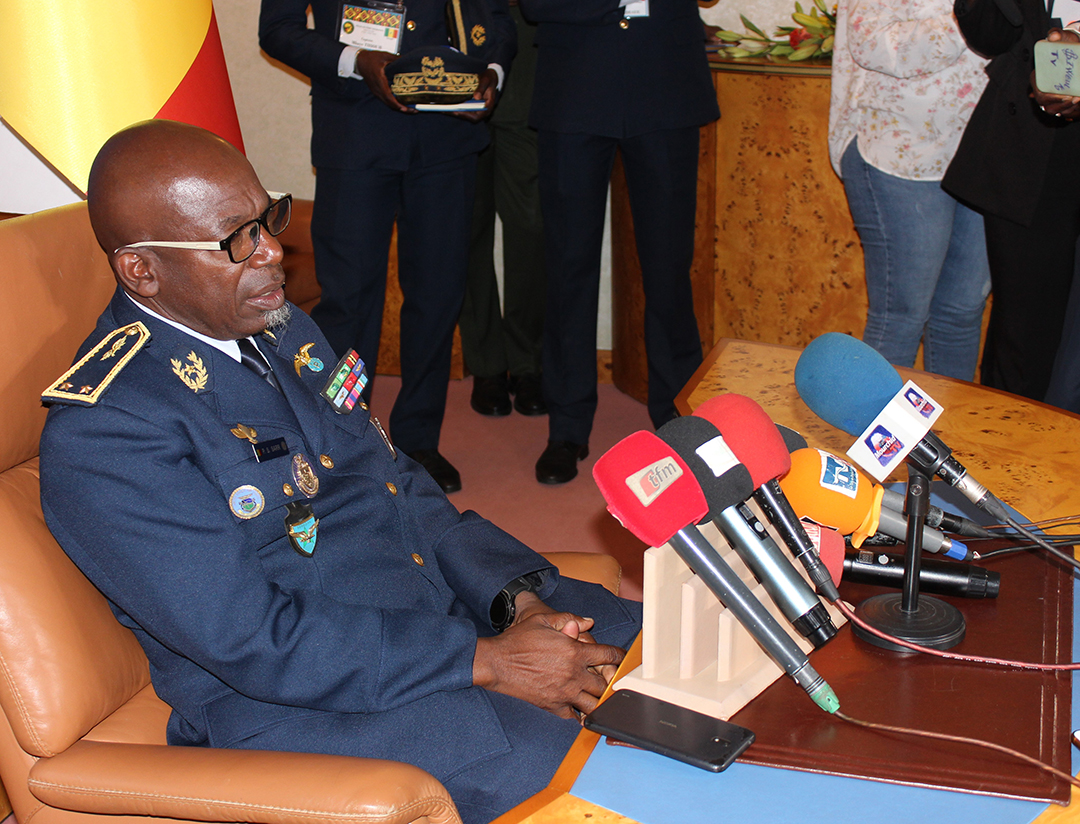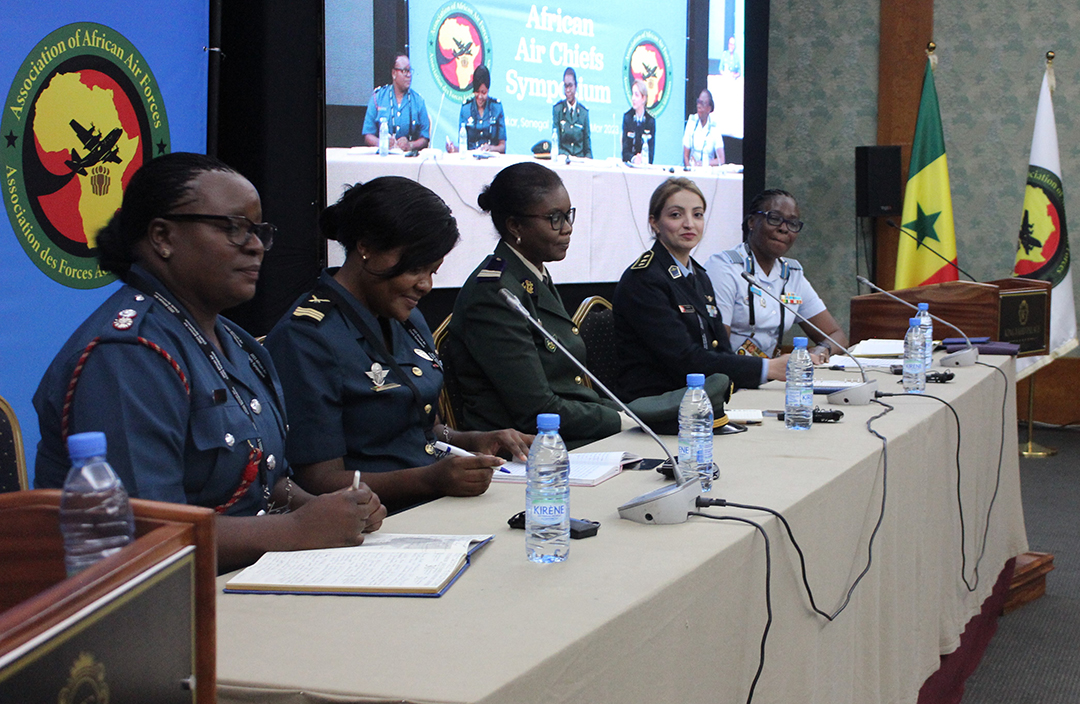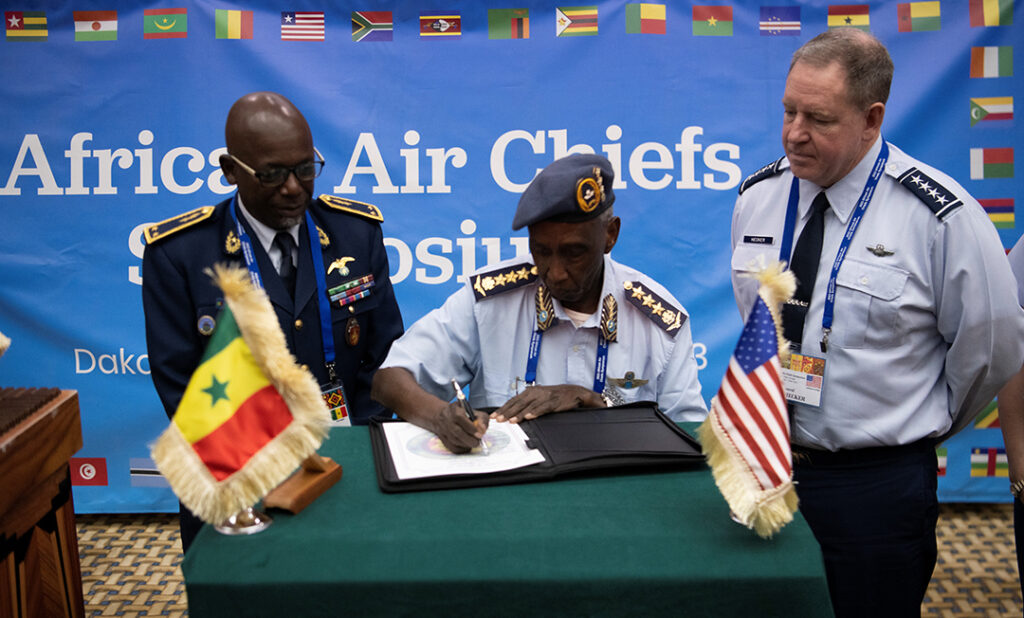ADF STAFF
Whether in the deserts of Somalia, across the porous borders of Niger or along the Gulf of Guinea coast, many African nations are facing similar threats of lawlessness and violent extremism.
African air forces can — and must — play a pivotal role in addressing these challenges by providing strategic airlift, humanitarian and disaster relief, and the ability to gather intelligence while monitoring threats.
That’s why air force chiefs and other personnel from nearly 40 countries met in Dakar, Senegal, from February 28 through March 3 for the 12th iteration of the African Air Chiefs Symposium (AACS) to talk about the challenges shared by many continental air forces.
“Our objective is, in part, to reaffirm the links among the air forces and at the same time to discuss subjects that are important for our cooperation,” Brig. Gen. Papa Souleymane Sarr, Senegal’s air chief of staff, told local reporters in French during a news conference at the four-day event.
Sarr served as co-host of the AACS along with Gen. James B. Hecker, commander of U.S. Air Forces in Europe & Air Forces Africa. The symposium theme was “African Air Forces in the Fight Against Transnational Threats.”

The symposium is held under the auspices of the Association of African Air Forces (AAAF), an air power collaborative established in 2015 when Côte d’Ivoire, Mauritania and Senegal joined the U.S. in signing the AAAF Charter. At this year’s AACS, Somalia became the 29th African nation to join the association when Brig. Gen. Mohamud Sheikh Ali Mohamed, Somali Air Force commander, signed the group charter during the opening ceremony.
Sarr cited the threat of violent extremism that has for more than a decade roiled Mali’s north and spilled over into neighboring Sahelian states such as Burkina Faso and Niger. In more recent years, that threat has made its way closer to coastal nations such as Benin, Ghana and Senegal.
“The threats now cross borders,” Sarr told local reporters. “We have a common enemy who is trying to wipe out all the efforts of our countries. So, we all have to work hand in hand to succeed in pushing back this enemy.”
Although Sarr said Senegal has the capacity to maintain its own security, he said cooperation among nations will be essential in meeting the threat, adding that Senegal will extend “an outstretched hand to all our friends.”
During the conference, air chiefs or their designates met for various presentations on humanitarian action and disaster relief; intelligence, surveillance and reconnaissance; women, peace and security; and other subjects. The symposium provided time for bilateral meetings between air chiefs so they could discuss more specific issues one on one.
The symposium also included a forum for senior enlisted officers and cultural performances to foster camaraderie among those attending.
Air force leaders from across the continent said they found value in coming together to share concerns and challenges.
“The symposium enhances our relationships,” said Brig. Gen. Hermalas Ndabashinze, chief of the Burundi Air Force. “We share our air force value among presentations and among bilateral meetings.” He said if air chiefs see something working elsewhere, they can try to apply that best practice to their own force.

Maj. Gen. Ian Macleod Chirwa, air force commander of Malawi, told ADF that his nation’s air force only came into existence within the past two years when it transitioned from an air wing.
“This conference has got so many advantages,” he said. “Malawi as a country values safety, security and peace. So, the vision of the African air chiefs is to come together and build a strong African relationship in terms of safety, peace and security. So, this is a special forum to contribute as a Malawian, as an air force, to contribute towards this important partnership with so many other countries.”
Niger, a nation surrounded by violent extremists originating in Mali to the west and northern Nigeria and the Lake Chad Basin to the southeast, considers regional and international cooperation essential to its security.
“This symposium is very important to us because we have to share experience, we have to create a mechanism where we can use our assets with other partners,” Col. Salifou Maïnassara , air force chief of staff for Niger, told ADF.
African nations participating in the symposium were Algeria, Angola, Benin, Botswana, Burundi, Cameroon, the Central African Republic, Chad, Côte d’Ivoire, the Democratic Republic of the Congo, Egypt, Equatorial Guinea, Eswatini, Gabon, Ghana, Guinea-Bissau, Kenya, Lesotho, Libya, Madagascar, Malawi, Mauritania, Morocco, Mozambique, Niger, Nigeria, the Republic of the Congo, Rwanda, Senegal, Sierra Leone, Somalia, Tanzania, Togo, Tunisia, Uganda and Zambia.
The next AACS is scheduled for early 2024 and will take place in Tunisia. Its theme will center on building next-generation capabilities for Africa.

